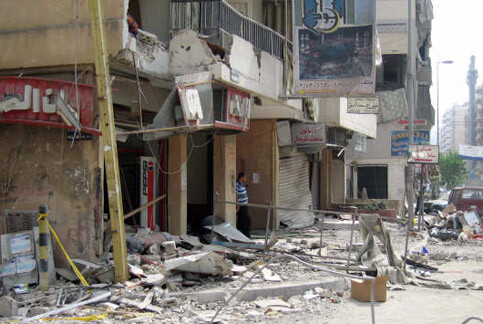south Lebanon 25 August 2006

Devastated stores in Lebanon after Israeli bombing. (Mayssoun Sukarieh)
Last week, I made my first trip to South Lebanon since the war began. Having traveled a fifth of the world, and been present during “wars” in Iraq, Palestine, and New York - I can honestly say that I have never seen such complete devastation in my entire life. The only thing that even comes close are the pictures I’ve seen from World War II. Much of South Lebanon simply lies in ruin.
In the South, Israeli warplanes occasionally break the sound barrier, rattling people as they fly off on God knows what missions. Israeli drones constantly fly overhead. The low, insistent hum of their engines serves as a continual reminder that Lebanon is not yet safe.
Bombed out gas stations and the twisted, blackened remains of what once were cars line the roads. The roads themselves are a wreck, pockmarked with craters and covered by fallen bridges, in places completely impassable. There are miles of roads lined with chalk-colored vegetation, so covered are they from the dust of destroyed buildings that you can see no green whatsoever. Almost every single city and village throughout South Lebanon has significant war damage. Almost every single one. The dead are still being pulled from the rubble.
In Qantara, a village of some three hundred and fifty families, twenty-five homes are destroyed, and another fifty seriously damaged. A man passes out pictures of his fifteen year old son in barely controlled panic. He hasn’t seen the boy for nearly a month.
In Sriefa, three entire blocks of homes are smashed to ground. Other buildings and shops throughout the town are bombed and destroyed. Women walk the streets, sobbing.
In Sultanya, dozens of homes are destroyed. The local hospital lies bombed and gutted by fire. The house I stayed at in the village has three unexploded cluster bombs in its garden.
Bint Jbeil, a city of over eighty thousand people, is completely shattered. Much of the city is simply rubble, but even what’s left standing is damaged. The entire back wall of the three-story primary school is just gone. The city center is barely passable to cars, so cratered are the roads. I literally did not see a single building in all of Bint Jbeil without serious damage. Not one. Not a one.
In Siddiqine, block after block of residential neighborhoods have been reduced to rubble. From over three-hundred multi-story homes and buildings, nothing larger than a breadbasket remains. I met a man wandering through the wreckage who gave a short, sardonic laugh when he found out I was an American. “Here is the democracy,” he said, pointing at the ruins, “here is the freedom.” Then his eyes teared up, as he told me that he couldn’t even figure out where his house used to stand.
This wasn’t a war against Hezbollah, with some collateral damage on the side. This was a war against the basic structures necessary to sustain civilians in South Lebanon. This was a war against the basic structures of human life.
But there are Lebanese who will not let that happen.
During the war, a coalition of Lebanese educators, engineers, architects, merchants, health care workers, NGO workers, students, and others, came together under banner of Civil Resistance - the Arabic phrase for non-violent direct action. Our founding statement of purpose began with the words, “We, the people of Lebanon, call upon the local and international community to join a campaign of civil resistance to Israel’s war against our country and our people. We declare Lebanon an open country for civil resistance.”
During the war we organized a fifty-two car convoy to take needed relief supplies from Beirut to the South, disregarding the Israeli ban on traveling in our own country. We were stopped by internal, Lebanese politics - something we are going to make sure does not happen again. Today, Lebanon is united in resistance to war.
Today, we are organizing a nation-wide petition demanding that the Lebanese government expel Jeffery Feldman, the U.S. Ambassador to Lebanon, as a threat to peace.
Today, we are organizing to provide direct assistance to communities in need throughout South Lebanon.
In just the past, few days we’ve organized solidarity missions to Qantara and Selaa. In Selaa, short hours before the ceasefire took effect, Israel destroyed thirty-five homes, killing at least eight people, and shutting off running water to the entire community.
We organized a mission to Selaa, building connections with civic leaders in the village. With donated funds from across Lebanon, we purchased a suction pump and water storage tanks for the villagers. We distributed food, donated clothes, children’s toys, and sanitary supplies. We located a doctor willing to come to the village to provide free medical exams, and helped fill needed prescriptions. Since the phone lines are down in the village, we contacted the Lebanese Army on their behalf to request assistance in removing unexploded bombs from the area.
As time goes on, we will maintain and deepen our ties to Selaa, Qantara, and other villages we are able to help, shifting from providing direct relief to other work, such as restoring schools and organizing cultural events. We will not give up.
We are not alone. Samidoun, another grassroots Lebanese coalition, is assisting three, other villages in South Lebanon. As we do our work in the South, we hear of other such coalitions, other such campaigns.
Abid Na’im lost his sixty-five year old father in the bombing of Selaa. There was barely enough left of the remains to bury but, despite his grief, Abid summed up the spirit of Lebanon today when he told us, “It’s impossible to beat the people. You can destroy the stones, you can destroy the homes—but you can’t destroy the people.”
Ramzi Kysia is a Lebanese-American essayist and activist. He’s working with LebanonSolidarity.org to resist war and renew shattered communities in Lebanon.
Related Links



